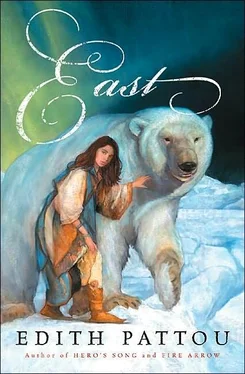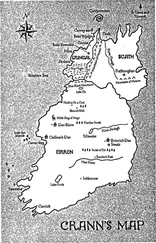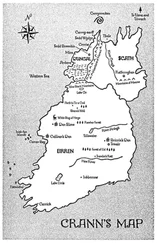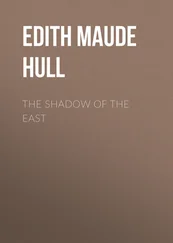Edith Pattou - East
Здесь есть возможность читать онлайн «Edith Pattou - East» весь текст электронной книги совершенно бесплатно (целиком полную версию без сокращений). В некоторых случаях можно слушать аудио, скачать через торрент в формате fb2 и присутствует краткое содержание. Год выпуска: 2002, ISBN: 2002, Издательство: Graphia, Жанр: Старинная литература, на английском языке. Описание произведения, (предисловие) а так же отзывы посетителей доступны на портале библиотеки ЛибКат.
- Название:East
- Автор:
- Издательство:Graphia
- Жанр:
- Год:2002
- ISBN:9780756950545
- Рейтинг книги:3 / 5. Голосов: 2
-
Избранное:Добавить в избранное
- Отзывы:
-
Ваша оценка:
- 60
- 1
- 2
- 3
- 4
- 5
East: краткое содержание, описание и аннотация
Предлагаем к чтению аннотацию, описание, краткое содержание или предисловие (зависит от того, что написал сам автор книги «East»). Если вы не нашли необходимую информацию о книге — напишите в комментариях, мы постараемся отыскать её.
East — читать онлайн бесплатно полную книгу (весь текст) целиком
Ниже представлен текст книги, разбитый по страницам. Система сохранения места последней прочитанной страницы, позволяет с удобством читать онлайн бесплатно книгу «East», без необходимости каждый раз заново искать на чём Вы остановились. Поставьте закладку, и сможете в любой момент перейти на страницу, на которой закончили чтение.
Интервал:
Закладка:
I stopped, staring with delight at the snow-white fur. I wasn't close enough to see its eyes clearly and what expression they held, but I was too young to be afraid, so I smiled widely at the animal. It gazed at me for a short time, then turned and lumbered away. I tried following, but it had vanished. Soon I got hungry and turned toward home.
I didn't tell Mother and Father about seeing the white bear, especially Mother, because I knew she'd insist on keeping me even closer to home. "You see!" she'd say. "Dangerous wild animals are out there. It's not safe."
I told Neddy, though, and was disappointed at his reaction. He frowned and said in that superior, older brother tone I hated, "You mustn't go anywhere near a white bear, Rose. They are dangerous and fierce creatures, with long, sharp teeth that will gobble you up. They are always hungry and they move very fast." He acted like he was some kind of expert on white bears.
I didn't pay any attention to him. From then on the white bear was my imaginary companion on all my explorations. I would pretend that I was riding along on its white-fur back, the two of us a fierce duo conquering and claiming new lands by the score.
I spent much of my childhood longing, in vain, to see a white bear again. It was extremely rare to see white bears in our part of the country. They were ice bears, isbjorn, that usually made their home in the snowy north.
White Bear
Watching for the child.
The girl with purple eyes.
Purple eyes.
And her smiling mouth.
Standing in the trees, watching her.
The girl.
Taller.
Unafraid.
She moves toward me.
Purple eyes, trusting.
Cannot.
Not safe for her.
Hunger.
Hunger.
Hunger.
Must go.
Quickly.
To feed.
Now.
Then return.
Neddy
WHEN ROSE WAS FIVE, she began to weave. The first thing she made was a belt with a crude design of a white bear. Those were her two passions: weaving (or sewing) and exploring with her imaginary white bear.
Inside the house she could always be found weaving belts on her small, rigid heddle loom. When we had more belts than we could ever use (some of the farm animals even sported Rose's belts), Mother taught Rose to work the household loom. By age eight Rose was her older sisters' equal when it came to weaving.
Then one day, taking a basketful of eggs to Widow Hautzig, Rose laid eyes on the widow's loom. Widow Hautzig was a local craftswoman who had a small business weaving coats and rugs and various other items to sell both in nearby Andalsnes and to wandering merchants who would take them to fairs and markets farther afield. To Rose, who knew only our own rough one at home, the widow's loom was large and impressive. It was twice as tall as Rose, and the wood was polished and carved with simple designs.
Unfortunately, Widow Hautzig was a grouchy old woman with no patience at all for a small, wild girl desperate to learn all about her beautiful loom. More than anything in the world, Rose longed for a loom of her own, a fine big one like the widow's. But she knew that was impossible, that Father would never be able to afford it. Still, Rose was stubborn, and she would not rest until she had found a way to get the Widow Hautzig to let her use her loom.
When she was nine Rose found out that Widow Hautzig had a weakness for chanterelle mushrooms. So Rose trained her favorite dog, Snurri, to sniff out chanterelles in the forest. After much hard work she struck a deal: In exchange for a weekly basket of chanterelle mushrooms, Widow Hautzig would teach Rose how to work her loom. Though the lessons were short and very disagreeable (often Rose would come home in tears over some gibe of the widow's), still Rose was a determined pupil, and before long the baskets of chanterelles were being traded for a chance to actually do her own weaving on the loom.
She could only do this during the very short breaks between Widow Hautzig's own projects, some of which took a long time to complete. And Rose would have had no time at all on the loom were it not for Widow Hautzig's rheumatism. When her rheumatism was acting up, the widow would take a long rest, sometimes even as much as a fortnight if it was a particularly bad bout.
"Thank God for Widow Hautzig's rheumatism," Rose would say every night before bed. Mother once overheard her and scolded her, so Rose was careful to whisper those words to herself from then on.
Even with Widow Hautzig's rheumatism, Rose never could weave anything that required more than a few days' work. Then, one day, as she was trying to discourage Snurri from digging under Widow Hautzig's storage hut, Rose saw something through a crack in the woodwork of the hut. There were no windows in the hut, but it was not locked, and without asking permission, Rose entered the small building. The inside was cloaked with dust and cobwebs, but Rose barely noticed. Her eyes were riveted by a good-sized loom leaning against the far wall of the hut. The frame listed at a precarious angle; the warp beam and heddle rods were splintered; there appeared to be no crossbeam at all; and a tangle of decayed and unraveled warp thread sprouted from top and bottom, but Rose was not discouraged.
It took Rose a long time and many baskets of chanterelles to convince Widow Hautzig to let her try her hand at fixing up the broken-down loom, which had been the castoff of an old aunt of the widow's. In return the widow made Rose clean the filthy old storage hut until it was spotless.
Rose then cajoled Father and me, as well as Willem, to help her repair the loom. Widow Hautzig offered no assistance, and even insisted that it not be removed from her property. She also complained unceasingly of the small amount of noise we made, hammering and sanding and such.
I was appalled when Widow Hautzig did not give Rose the loom outright, since she had no use for it herself. What rankled even more was that die nasty woman even continued to demand chanterelle fees for the use of the loom we repaired, and made Rose work in that windowless, unheated hut.
Nevertheless, I'd never seen Rose so happy as when she could grab a few moments to go off and work on the loom.
I wrote a poem about Widow Hautzig. It began
Hautzig the weaver, queen of the dead .
The strands in her loom dripping with red.
Lips dry as bone, her hair made of snakes,
The souls of her victims to Hel she does take.
Well, maybe I exaggerated. But only a little.
Rose
THE FIRST THING I MADE on Widow Hautzig's loom was a table runner. It had a simple reindeer design in the weave, and I was absurdly proud of it. My next projects were a shawl for Mother and head scarves for my three sisters. Then I made a jacket for Neddy and a pair of breeches for Father.
The last thing I made on that loom was for me. A cloak. It took me nearly half a year to finish. It was during this time that things went so wrong with the farm.
Father told me the bad luck began the year I was born. The barley crop failed, and that setback was followed by an unusually harsh winter that killed off our largest sow. Since then there had been blight that killed our fruit trees, a sickness that went through our poultry, not to mention a heartbreaking series of crop failures. By the summer when I was working on my cloak, there was so little to go around that it didn't seem right to be hunting chanterelles for Widow Hautzig; nor was there much time for weaving, other than that which was strictly necessary. We were all working so hard just to keep from starving. And there was no extra wool for spinning.
For a long time I had been in the habit of scrounging for tufts of wool. I would find them stuck to fences and the bark of trees. But it really wasn't enough, and it was only thanks to Father that I was able to finish my cloak at all. He brought me wool, clumps that he had bargained for from neighbors, and he insisted that I take breaks from chores to go chanterelle hunting with Snurri.
Читать дальшеИнтервал:
Закладка:
Похожие книги на «East»
Представляем Вашему вниманию похожие книги на «East» списком для выбора. Мы отобрали схожую по названию и смыслу литературу в надежде предоставить читателям больше вариантов отыскать новые, интересные, ещё непрочитанные произведения.
Обсуждение, отзывы о книге «East» и просто собственные мнения читателей. Оставьте ваши комментарии, напишите, что Вы думаете о произведении, его смысле или главных героях. Укажите что конкретно понравилось, а что нет, и почему Вы так считаете.












